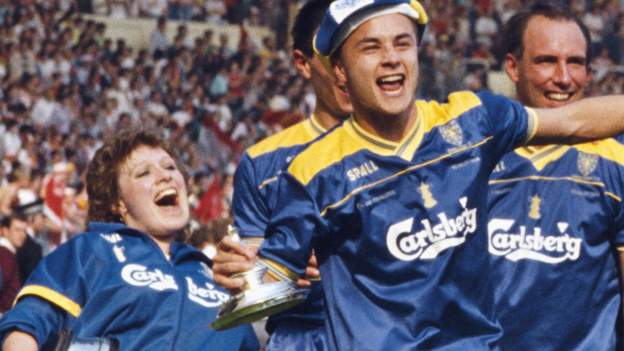Caroline Brouwer’s path to becoming Wimbledon’s physiotherapist for the 1988 FA Cup final was far from easy. The year was 1981, and as she exited the job interview, an argument ensued among the coaches about having a woman on the team. Despite the resistance, Brouwer’s qualifications won her the position in a club quite distinct from today’s standards.
Unbeknownst to her, Brouwer had joined a dressing room that would go down in English football history. Wimbledon, a team known for its blend of camaraderie and brutality, was on the rise. Over the next few years, they would earn multiple promotions, rapidly ascending to the top flight of English football.
Caroline’s father, Thom, had been a fan of Dutch football, considering English football to be crude in comparison. Nonetheless, Caroline’s love for the game was fostered by her father’s passion. From a young age, she played football with local boys, even volunteering at a nearby club when opportunities for girls were scarce.
Recognizing her potential, the team physio, John Deary, suggested that Caroline enroll in the Football Association’s Treatment of Injury course at Lilleshall. After completing the course, she caught Wimbledon’s attention, despite encountering a less than welcoming atmosphere during her initial visit.
Caroline emphasizes that her experience as one of the few women working in men’s football wasn’t necessarily worse, but it certainly posed challenges. She developed a thick skin to handle the attempts to shock her, such as players’ inappropriate behavior. However, with the support of coach Don Howe and her determination to focus on her job, she navigated through those moments.
Wimbledon’s meteoric rise was driven by their efficiency on the field, emotional bond as a team, and unwavering dedication to hard work. Contrary to popular belief, they were not simply a group of troublemakers but a well-drilled, physically fit team. Caroline acknowledges that the players’ physicality sometimes overshadowed their technical prowess, but their achievements spoke for themselves. Several players moved on to bigger clubs and received international call-ups.
Caroline’s role extended beyond physical treatment. In an era without much provision for mental health, she provided support to players suffering from long-term injuries. She created a safe space for them to talk, helping them through their treatments while also maintaining their confidentiality.
The pinnacle of Wimbledon’s journey came in the 1988 FA Cup final against Liverpool. The clash between Wimbledon’s rough style and Liverpool’s elegance was highlighted by commentator John Motson, who dubbed Wimbledon the Crazy Gang and Liverpool the Culture Club. The underdogs, fueled by their physicality and belief, defeated Liverpool to claim the trophy.
Caroline recalls the intense atmosphere in the dressing room before the match. Wimbledon’s players, while needing to be calmed down, were not intimidated and truly believed they could win. The game itself was physical, and Caroline’s main concern was the scorching conditions at Wembley Stadium. With a well-executed plan to reduce core temperatures, Wimbledon’s players returned to the dressing room after the game completely drained, having given their all for the victory.
Following their historic triumph, the celebrations ensued. Wimbledon’s raucous party, held in a marquee on the Plough Lane pitch, attracted various guests, including actor friends of June Whitfield, the chairman of their supporters club. The inclusivity and joy of the celebration reflected the essence of Wimbledon’s culture.
Caroline left Wimbledon in 1994 but still occasionally attends games at Plough Lane as a regular fan. She reflects on the progress made since her time, noting how a female physio can

5 comments
Woah, what a cool story! The Wimbledon team in ’88 had quite the journey, and Caroline Brouwer played a big role as their physio. It’s crazy to think how different things were back then, especially for a woman in men’s football. But she handled it like a boss and became an important part of the team. Props to her for breaking barriers and being a trailblazer!
OMG, Wimbledon’s rise to the top was epic! They went from fighting relegation to dominating English football. And having a woman like Caroline Brouwer in the mix just adds to the legend. It’s inspiring to see how she dealt with all the macho nonsense and did her job with passion. The ’88 FA Cup final must have been pure madness, with Wimbledon taking on Liverpool. Such a memorable moment in football history!
I never knew the story behind Wimbledon’s success in the ’80s until now. Caroline Brouwer’s journey is fascinating, from facing resistance during her job interview to becoming an integral part of the team. It’s a shame that she didn’t receive the attention she deserved at the time, but her impact was undoubtedly significant. And that ’88 final against Liverpool? Absolutely legendary! Wimbledon’s triumph is a testament to their determination and teamwork.
Wimbledon’s rise through the ranks is a story that deserves more recognition. The dedication and hard work of the players, along with the support of people like Caroline Brouwer, brought them to the top. It’s great to see how football has evolved, with more opportunities for women in the sport. Caroline’s experience shows that perseverance pays off. And that ’88 final? Unforgettable! Wimbledon showed the world what they were made of.
This article is a hidden gem! I never knew about Caroline Brouwer and her role with Wimbledon during their glory days. The struggles she faced in a male-dominated environment are admirable. It’s incredible how she helped players both physically and mentally. Wimbledon’s journey to the ’88 FA Cup final is something every football fan should know. The contrast between their style and Liverpool’s was unforgettable. Kudos to Caroline and the entire Wimbledon team for their achievements!